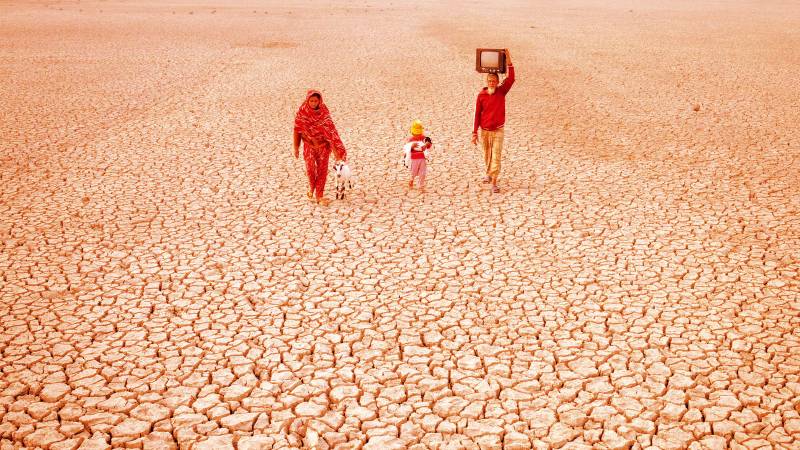
Pakistan has faced catastrophic floods, droughts, and cyclones in recent years that have killed and displaced thousands, destroyed livelihoods, and damaged infrastructure. Climate change raises the prospect that these and other natural hazards will increase in frequency and severity in the coming decades, a stark reminder that Pakistan is one of the countries most vulnerable to the effects of climate change.
In the last 50 years, the annual mean temperature in Pakistan has increased by roughly 0.5°C. The number of heat wave days per year has increased nearly five fold in the last 30 years. Annual precipitation has historically shown high variability but has slightly increased in the last 50 years. The sea level along the Karachi coast has risen approximately 10 centimeters in the last century.
By the end of this century, the annual mean temperature in Pakistan is expected to rise by 3°C to 5°C for a central global emissions scenario, while higher global emissions may yield a rise of 4°C to 6°C. Average annual rainfall is not expected to have a significant long-term trend but is expected to exhibit large inter-annual variability. The sea level is expected to rise by a further 60 centimeters by the end of the century and will most likely affect the low-lying coastal areas south of Karachi towards Keti Bandar and the Indus River delta.
In the face of a rapidly changing climate and the ever-increasing threats posed by environmental degradation, a clarion call for action resonates globally. Climate change is no longer a distant specter but a pressing reality.
To address this monumental challenge and strive for climate justice, a set of guiding principles is needed. Enter the Ten Green Commandments, a roadmap to a sustainable future that prioritizes the well-being of our planet and its inhabitants. These commandments provide us with a way forward to achieve climate justice, ensuring that no one is left behind in the transition to a more sustainable world.
Commandment 1: Reduce Carbon Emissions
The first and most crucial commandment is to reduce carbon emissions. Transitioning to renewable energy sources, improving energy efficiency, and embracing cleaner transportation options are key steps in mitigating climate change. By cutting greenhouse gas emissions, we reduce the pace and severity of global warming, allowing ecosystems to adapt and recover.
Commandment 2: Promote Sustainable Agriculture
The second commandment emphasizes the need for sustainable agriculture practices. By prioritizing regenerative farming, crop rotation, and organic farming, we can protect our soil, promote biodiversity, and reduce the carbon footprint of our food production. Sustainable agriculture is vital for ensuring food security while preserving the planet.
Commandment 3: Preserve Biodiversity
Biodiversity is the cornerstone of a healthy planet. The third commandment calls for the protection of endangered species and ecosystems. By preserving biodiversity, we maintain the balance of nature and ensure the resilience of ecosystems in the face of climate change.
Commandment 4: Conserve Water Resources
Water is essential for life, and the fourth commandment highlights the importance of water conservation. We must use this resource wisely, invest in water-saving technologies, and protect watersheds to ensure a sustainable supply for generations to come.
Commandment 5: Promote Sustainable Transportation
Sustainable transportation is the key to reducing emissions and promoting climate justice. The fifth commandment encourages the development of public transportation, biking infrastructure, and the adoption of electric vehicles. By making these options accessible and affordable, we reduce the environmental impact of transportation.
Commandment 6: Reduce, Reuse, and Recycle
The sixth commandment is a familiar mantra but remains critical in the fight against climate change. Reducing waste, reusing items and recycling materials contribute to a circular economy, minimizing the use of virgin resources and lowering greenhouse gas emissions.
Commandment 7: Support Green Technologies
Innovation is essential in the transition to a more sustainable world. The seventh commandment promotes investment in green technologies, such as solar panels, wind turbines, and energy storage solutions. These technologies help us move away from fossil fuels and create green jobs in the process.
Commandment 8: Promote Environmental Education
Education is a powerful tool in the fight for climate justice. The eighth commandment encourages comprehensive environmental education, ensuring that future generations are well-informed and equipped to address the challenges of climate change.
Commandment 9: Advocate for Climate Justice
The ninth commandment underscores the importance of advocating for climate justice. It's not enough to reduce emissions; we must also address the disproportionate impact of climate change on marginalized communities. By advocating for equitable policies and actions, we ensure that no one is left behind.
Commandment 10: Live Sustainably
The final commandment is a call to action for individuals. Living sustainably means making conscious choices in our daily lives, from reducing meat consumption and conserving energy to supporting local and eco-friendly products. Our collective actions can have a profound impact on the planet.
The Ten Green Commandments provide a comprehensive roadmap for addressing the urgent challenges of climate change and achieving climate justice. By reducing emissions, protecting biodiversity, conserving resources, and promoting sustainability at every level of society, we can pave the way to a more equitable and sustainable future. It is through these commandments that we can honor our commitment to the planet and ensure a just transition for all. Climate justice is not an option; it's a moral imperative that we must all embrace.

